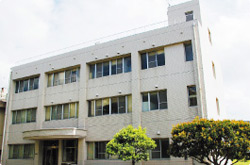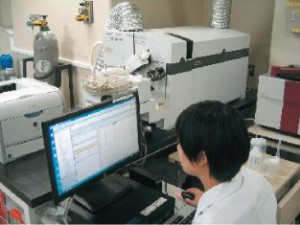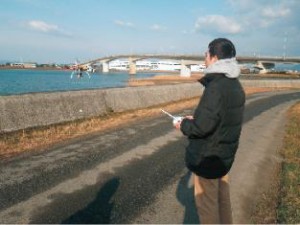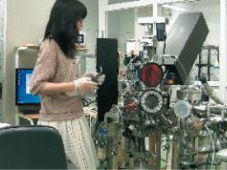 Students study required subjects including humane and social science, communication, mathematics and natural science, and basic engineering, as well as elective subjects of their majoring fields. They are expected to both develop various points of view and establishing their academic specialty.
Students study required subjects including humane and social science, communication, mathematics and natural science, and basic engineering, as well as elective subjects of their majoring fields. They are expected to both develop various points of view and establishing their academic specialty.
In order to acquire skills and knowledge of interdisciplinary fields of engineering, a concept of PBL (Problem/Project Based Learning) is applied to some experiment subjects such as “Basic Industrial Measurement,” or “Basic Engineering Seminar.”
In addition to present JABEE accredited curriculum, the following subjects are supposed to open so as to develop higher level practical engineering skills:
- ”Socio-engineering” field subjects concerning global viewpoints, contribution to community, and industrial technology.
- ”Programs of students’ own initiative” including internship, development of students’ project designing ability.
- ”Research promoting” activity including cooperation with other institutions.
Goals to achieve in learning and education at Production Systems Engineering Course accredited by Japan Accreditation Board for Engineering Education (JABEE).
(1) An engineer capable of communicating both in Japanese and English being equipped with competency in the international community.
- 1-1: An engineer having an appropriate command of written expression and oral communication in Japanese.
- 1-2: An engineer with a sufficient command of English to understand outlines of technical and academic documents in English.
- 1-3: An engineer with a sufficient command of English as to write an abstract of an academic paper as well as to make an oral presentation.
(2) An engineer equipped with fundamental ICT techniques and relevant applied knowledge of engineering.
- 2-1: An engineer capable of collecting data after experiments using measurement techniques of ICT technology.
- 2-2: An engineer capable of analysing collected data and information mathematically and help to solve problems in respective engineering specialities using such analytical result.
(3) An engineer equipped with knowledge and skills of fundamental technology in multiple areas as well as those of highly specialized technique in the area, which make the engineer skilful enough to solve problems with methods of integrative thinking and to adapt them to practical field of industrial technology.
- 3-1: An engineer capable of utilizing basic knowledge of mathematics and natural history for tasks in each specialized area.
- 3-2: An engineer being capable of comprehending and explaining relevance among various specialized disciplines.
- 3-3: An engineer being capable of making appropriate use of fundamental knowledge to comprehend questions and subjects on engineering then give an account of such matters.
- 3-4: An engineer capable of utilizing techniques of experiments for analysis and evaluation of research results that have been obtained after proper design and execution.
(4) An engineer having well-balanced characters of spirit, mind and body as well as social wellbeing and cooperative personality.
- 4-1: An engineer with broad knowledge of different areas and capable of comprehending issues from global viewpoints.
- 4-2: An engineer capable of understanding different cultures and recognize diversified values.
- 4-3: An engineer capable of engaging eagerly for and interested in participating in social activities.
- 4-4: An engineer being able to take part in group activities and being able to play a cooperative role.
(5) An engineer with broad views and high sense of ethics upon engineering and with awareness to contribute to society.
- 5-1: An engineer capable of understanding ethical issues on science and engineering and indicate problems in the field.
- 5-2: An engineer capable of understanding practical problems and can apply technical and ethical knowledge to such problems.
(6) An engineer who is an intellectual explorer, being capable of challenging problems with aggressiveness and creativity.
- 6-1: An engineer being able to cope with those challenges in the best specialities with spirit of enquiry and an eager desire to know further and better.
- 6-2: An engineer capable of planning and designing ways of problem solving corresponding to needs of the society, making the full use of one’s best specialized knowledge and techniques.
- 6-3: An engineer capable of keeping studying on one’s own initiative, getting hold of and recording one’s research and learning processes.



